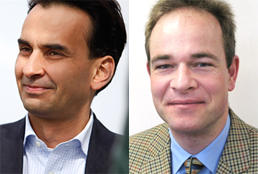KFG International Workshop "Hidden Continuities: From Interwar to Postwar Forms of Cooperation and Integration in Europe", June 25-26, 2015
Aug 05, 2015
"Hidden Continuities: From Interwar to Postwar Forms of Cooperation and Integration in Europe" was the third workshop organized by Kiran Klaus Patel (University of Maastricht) and Wolfram Kaiser (University of Portsmouth). Building on an earlier workshop in October 2014, the conference in June has been the final part in the first set of workshops led by Kiran Patel.
To sign the treaty creating the European Coal and Steel Community (ECSC), the foreign ministers of Belgium, France, the Federal Republic of Germany, Italy, Luxembourg, and the Netherlands met in Paris in April 1951. In a solemn Joint Declaration, they represented the ECSC as a radical rupture with history, as if Europe had been completely disorganized prior to 1951. The ECSC Treaty, too, evoked an image of a divided and conflictuous past, against the backdrop of which the newly found form of international cooperation shone even brighter. Since 1951, official European Union documents and a wide variety of other sources have forged a similar image, undergirded by assumptions about major discontinuities and the formation of ‘core Europe’ as a collective supranational break with a past characterized by ideological divides and extreme nationalism.
This workshop discussed a different way of seeing the history of European integration. It challenged the sometimes explicit and more often implicit assumptions in the literature and the broader public about 1945 as a ‘zero year,’ heralding a new age of European cooperation and integration. Instead, it explored connections between proposals and practices of governing Europe between the inter-war, war, and post-war periods during the twentieth century.
Building on an earlier workshop in October 2014 (see the report here), the contributors to this gathering presented the revised versions of their papers. Planned as an internal author workshop, debates fully focused on further improving the individual texts and on strengthening the overall consistency of the project in preparation of a publication as an edited volume. The workshop underlined the importance of this approach and demonstrated the multiplicity and multifariousness of the links that connect the interwar, wartime, and postwar forums of European cooperation and integration during the twentieth century. We hope to publish the project’s findings in 2016 or 2017.
